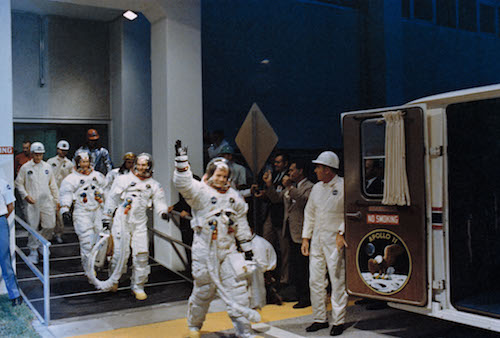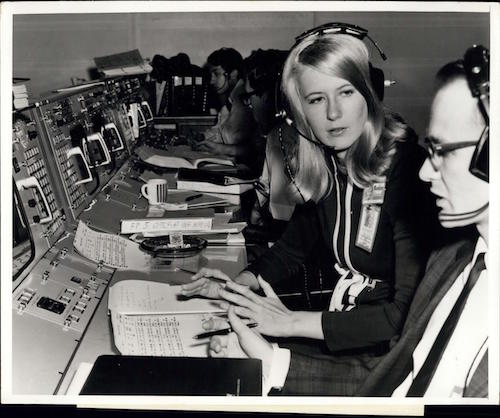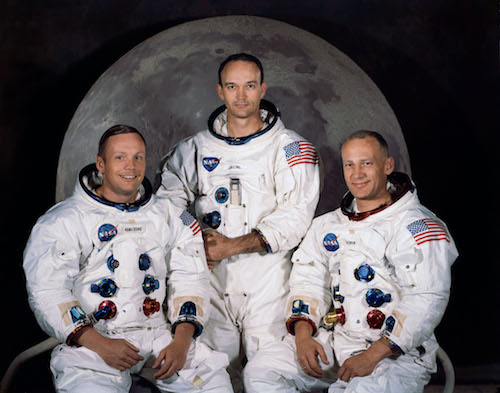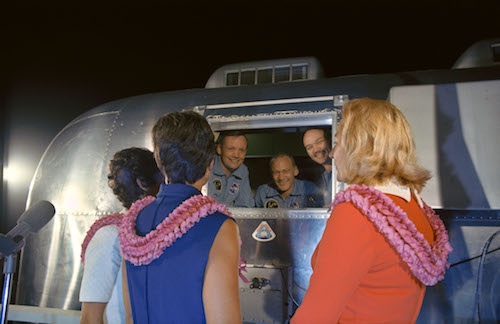Communiqué
Chasing the Moon | AMERICAN EXPERIENCE | Concludes Wednesday, July 10 at 9
< < Back toAmerican Experience “Chasing the Moon” from Academy Award Nominee Robert Stone
Premieres Monday-Wednesday, July 8-10, 2019 on PBS
Celebrating the 50th Anniversary of the Moon Landing,
This Six-Hour Series Explores the 10-Year Space Race Odyssey
“Chasing the Moon,” a new six-hour documentary series about the space race, from its earliest beginnings to the monumental achievement of the first lunar landing in 1969 and beyond, will premiere Monday-Wednesday, July 8-10, 2019, 9:00-11:00 p.m. on WOUB. Scheduled in conjunction with the 50th anniversary of the Apollo 11 moon landing, “Chasing the Moon” is a film by Robert Stone and marks his eighth project for American Experience.
 “Chasing the Moon” thoroughly reimagines the race to the moon for a new generation, upending much of the conventional mythology surrounding the effort. The three-part series recasts the Space Age as a fascinating stew of scientific innovation and PR savvy, political calculation and media spectacle, visionary impulses and personal drama. With no narration and using only archival footage — including a visual feast of previously lost or overlooked material — the film features new interviews with a diverse cast of characters who played key roles in these historic events. Among those included are astronauts Buzz Aldrin, Frank Borman and Bill Anders; Freeman Dyson, the renowned futurist and theoretical physicist; Sergei Khrushchev, the son of former Soviet premier Nikita Khrushchev, who played a prominent role in the Soviet space program as a rocket engineer; Poppy Northcutt, the 25-year-old “mathematics whiz” who gained worldwide attention as the first woman to serve in the all-male bastion of NASA’s Mission Control; and Ed Dwight, the Air Force pilot selected by the Kennedy administration to train as America’s first black astronaut.
“Chasing the Moon” thoroughly reimagines the race to the moon for a new generation, upending much of the conventional mythology surrounding the effort. The three-part series recasts the Space Age as a fascinating stew of scientific innovation and PR savvy, political calculation and media spectacle, visionary impulses and personal drama. With no narration and using only archival footage — including a visual feast of previously lost or overlooked material — the film features new interviews with a diverse cast of characters who played key roles in these historic events. Among those included are astronauts Buzz Aldrin, Frank Borman and Bill Anders; Freeman Dyson, the renowned futurist and theoretical physicist; Sergei Khrushchev, the son of former Soviet premier Nikita Khrushchev, who played a prominent role in the Soviet space program as a rocket engineer; Poppy Northcutt, the 25-year-old “mathematics whiz” who gained worldwide attention as the first woman to serve in the all-male bastion of NASA’s Mission Control; and Ed Dwight, the Air Force pilot selected by the Kennedy administration to train as America’s first black astronaut.

While other documentaries have largely painted a familiar narrative of goals set, obstacles overcome, disasters averted and missions accomplished, “Chasing the Moon” tells a vastly more entertaining and surprising story. As the film reveals, the drive to land a man on the moon was fueled as much by politics as it was by technology and was a controversial undertaking during a volatile time.
“When we think of that breathtaking moment of the 1969 moon landing, we forget what a turbulent time that was,” said Mark Samels, American Experience executive producer. “The country was dealing with huge problems — Vietnam, poverty, civil rights — and there was a lot of skepticism about the space program. ‘Chasing the Moon’ explores the unbelievably complex challenges that NASA was able to overcome. Not a week goes by when someone doesn’t say, ‘Why can’t we do something today as ambitious, as grand as putting a man on the moon?’ It was a century-defining achievement, and our film tells a familiar story in an entirely new way.”
 “As a 10-year-old kid in England in July 1969, my mother woke me up in the middle of the night to watch two Americans set foot upon another world, the Moon quite literally staring at us through the window above our television set,” said Oscar and Emmy Award-nominated filmmaker Robert Stone. “I’d recently seen Kubrick’s “2001: A Space Odyssey” and the one-two punch of those two intensely visceral experiences ignited a fire in my mind that’s stuck with me ever since. It’s when I first began to want to be a filmmaker. In many ways, ‘Chasing the Moon’ is the culmination of a lifetime of thoughts that have been churning through my mind about this extraordinary period in which I grew up, about the boundless ambition and promise of a brighter future that space travel inspired, the belief that anything is possible if we join together in a common goal, and the urgency it ignited to preserve and care for our home planet. Having PBS as a partner to take this film out worldwide is a real honor for me.”
“As a 10-year-old kid in England in July 1969, my mother woke me up in the middle of the night to watch two Americans set foot upon another world, the Moon quite literally staring at us through the window above our television set,” said Oscar and Emmy Award-nominated filmmaker Robert Stone. “I’d recently seen Kubrick’s “2001: A Space Odyssey” and the one-two punch of those two intensely visceral experiences ignited a fire in my mind that’s stuck with me ever since. It’s when I first began to want to be a filmmaker. In many ways, ‘Chasing the Moon’ is the culmination of a lifetime of thoughts that have been churning through my mind about this extraordinary period in which I grew up, about the boundless ambition and promise of a brighter future that space travel inspired, the belief that anything is possible if we join together in a common goal, and the urgency it ignited to preserve and care for our home planet. Having PBS as a partner to take this film out worldwide is a real honor for me.”
The broadcast of “Chasing the Moon” will be accompanied by an immersive, interactive website hosting original digital content that further explores themes and topics from the film. In addition to the July 8-10 broadcast premiere, “Chasing the Moon” will have an encore broadcast on Tuesdays, July 16, 23 and 30, 9:00-11:00 p.m.
Ballantine Books, an imprint of Penguin Random House, will publish the book Chasing the Moon, by Stone and writer/researcher Alan Andres, to coincide with the PBS premiere. The book will include and expand on the stories examined in the documentary.
 PART ONE: A Place Beyond the Sky begins in 1957 and tracks the early years of the space race as the United States struggles to catch up with the Soviet Union. The episode reveals breathtaking failures and successes of the nascent American space program and demonstrates the stakes and costs of reaching the moon.
PART ONE: A Place Beyond the Sky begins in 1957 and tracks the early years of the space race as the United States struggles to catch up with the Soviet Union. The episode reveals breathtaking failures and successes of the nascent American space program and demonstrates the stakes and costs of reaching the moon.
PART TWO: Earthrise covers 1964-1968, four heady, dangerous years in the history of the space race, focusing on the events surrounding the Apollo 1 and Apollo 8 missions. As Americans moved through the 60s and reflect on the challenges ahead, many begin to wonder: What exactly is it going to take to beat the Soviets to the moon?
PART THREE: Magnificent Desolation, which covers 1969-1970, takes Americans to the moon and back. Dreams of space dramatically intersect with dreams of democracy on American soil, raising questions of national priorities and national identity. The final episode also considers what happens to scientific and engineering programs — and to a country — after ambitious national goals have been achieved.
About the Filmmakers
A Robert Stone Productions film in association with ARTE France for American Experience
| Written, Produced and Directed By | ROBERT STONE |
| Producers | DANIEL AEGERTER, KEITH HAVILAND, AND
RAY ROTHROCK |
| Music By | GARY LIONELLI |
| Edited By | LINDY JANKURA & ROBERT STONE |
American Experience is a production of WGBH Boston
| Senior Producer | SUSAN BELLOWS |
| Executive Producer | MARK SAMELS |
Robert Stone is a multi-award-winning, Oscar-nominated and Emmy-nominated documentary filmmaker. Born in England, he grew up in both Europe and America. After graduating with a degree in history from the University of Wisconsin-Madison, he moved to New York City in 1983 to pursue a career in filmmaking. He gained considerable recognition for his first film, Radio Bikini (1987), which premiered at Sundance, was nominated for an Academy Award for Best Feature Documentary and was the first of his seven films to premiere on American Experience. His best-known works includes Guerrilla: The Taking of Patty Hearst (2004), which premiered at Sundance and went on to become one of the most highly acclaimed theatrical documentaries of the year. That was followed by the documentary feature Oswald’s Ghost (2007), for which Stone earned a second Emmy nomination for Outstanding Achievement in Non-Fiction Filmmaking. Earth Days was the Closing Night Film at the 2009 Sundance Film Festival and was released theatrically to wide critical acclaim. His next film, Pandora’s Promise, premiered at the 2013 Sundance Film Festival, won the prestigious Green Award at the Sheffield Documentary Film Festival and was broadcast on CNN in 2013. In addition to Radio Bikini, Guerrilla, Oswald’s Ghost and Earth Days, Stone also produced The Satellite Sky, Civilian Conservation Corps and Cold War Roadshow for American Experience.

